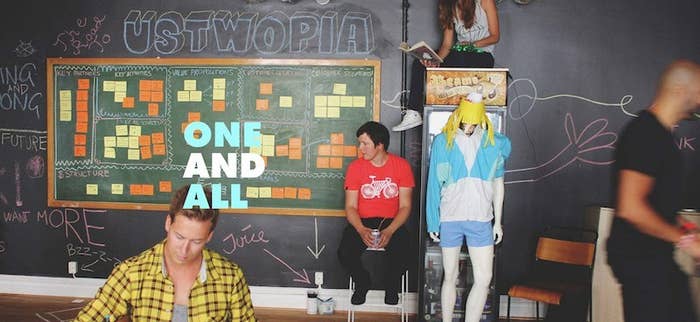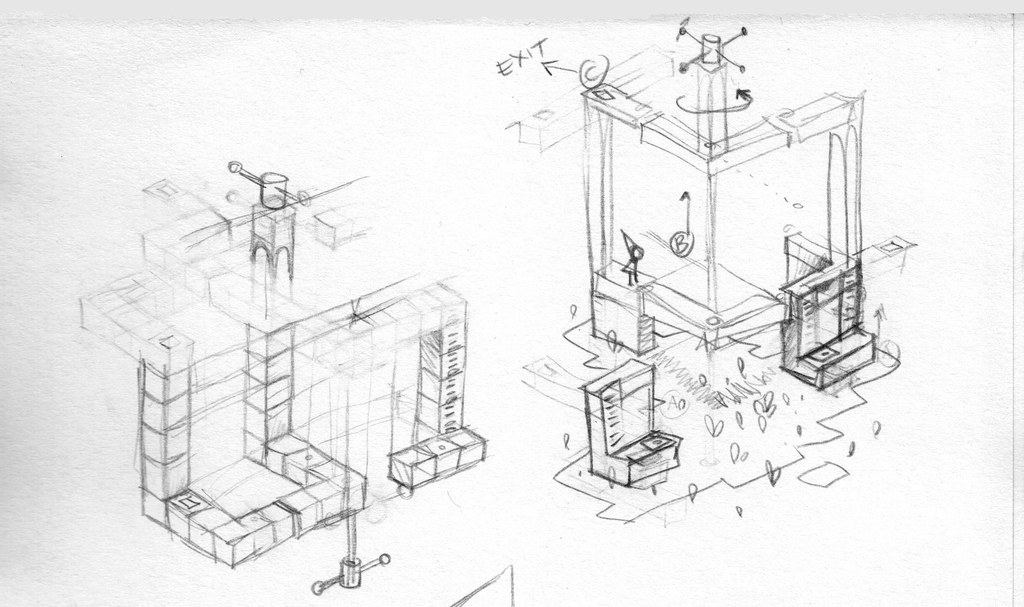
The most popular app on the paid section of the iOS store — ahead of the sleep cycle monitors, photo editors, and fast fitness programs — is Monument Valley, an indelibly beautiful puzzle game that I called, last week, a "head orgasm." In a few obvious ways, the game belongs among the great indie gaming success stories of the past five years. Like Braid and Limbo and Journey, it features an arresting and unique aesthetic, no explicit violence, and a thoughtful, nearly philosophical tone.
In another, fundamental, way, Monumental Valley isn't meaningfully "indie" at all: Ustwogames, the eight-person studio behind the hit, is nested within ustwo, a 187-person digital product studio that counts among its clients Sony, Barclay's, Fujitsu, and JP Morgan and has offices in London, New York, and Malmo, Sweden. Founded in 2004, ustwo is the kind of place where the founders — two British graphic designers — go by a joint nickname (Mills and Sinx), where the only office rule is that there must be a song playing (the choice of which is adjudicated by special voting software), and where a custom company intranet aggregates employees' Instagram feeds.
The production conditions of most "indie" hits have mostly fallen into a few categories: acute privation, Kickstarter-funded subsistence, and, for a very few, major corporate backing. Surely cultivation amid a thriving, achingly hip digital product startup has not been among them.
But that's exactly the environment in which Monument Valley was born, and to which, according to the game's designer, Ken Wong, it owes much of its success.
"Being surrounded by so many non-gamers had a really good effect on the project," Wong told BuzzFeed. "We didn't want to make something that they wouldn't understand when it was all done."

To make sure of that, Wong and the game's executive producer, Dan Gray, regularly enlisted employees from throughout the London office to test Monument Valley. "We saw what made them smile and what made them frustrated," Wong said. "I don't know if many other teams of this size have the luxury to do that."
And unlike the testers at major game studios, the testers at ustwo weren't worked-to-the-bone game fanatics hoping to break into the industry. They were animators, graphic and user interface designers, and programmers, people with a broad cultural palette and a deep understanding of the way people use mobile devices.
Wong and Gray both say that the feedback they've received since the game's release — from adults who had never finished a game before Monument Valley to parents playing with their children — has been a testament to that inclusive testing process.
"We seem to have created a game that people want," said Gray.

And they did it in a year, under material conditions basically unheard of in the gaming industry. Ustwogames started in 2011 as as team without much direct experience in the gaming world — the staffers were app developers and graphic designers — and its first game, Whale Trail, was a minor success. Buoyed, Matt Miller, one of ustwo's founders, decided to hire directly from the gaming industry to add to the Whale Trail team. Among these 2013 hires were Wong and Gray.
Miller gave the newly formed team no set budget, no specific timeframe, and total creative independence. "It's important that they can make their own decisions on what they produce," he said. "The only thing I ask of them is to make something we can all be proud of."
Wong, the designer, remembered his early days at ustwo similarly: "Basically we arrived and were told: 'Make something special, don't worry about the money. It would great if you become profitable at some point, but it's not the main focus.'"
The utopian startup, freethinking, effortlessly mixing creativeness and commerce: It's the hoariest of tech cliches. Still, in the gaming world, it's something of a fresh idea. The phrase "gaming startup" has awful connotations, due to profit-obsessed, lurching behemoths like Zynga and King. It's true that there are creative and media firms that own gaming companies or make games, but these tend to be either at the behest of a client or more obviously commercial than Monument Valley, which is genuinely artistic in its ambitions.
The best and most exciting technology companies turn creative inspiration into beautiful and easy-to-use products. And that's exactly what seems to have happened at ustwogames during the making of Monument Valley.
Whether or not the ustwogames model can be replicated is unclear; it may simply be a case of very talented and motivated people given the right support. But the lessons behind Monument Valley's success — that games could use more input from bright non-gamers, and that the most commercially successful things are sometimes designed without commerce explicitly in mind—are obvious. It's a lesson that the most successful tech companies — Apple, Google — have always known.
As for ustwo, the profit from Monument Valley — which has already recouped its budget — will be invested back into the company equally, not just into the games team. Why? Says Miller, "This is because the freedom ustwogames has is only possible because of the entire ustwo team."
